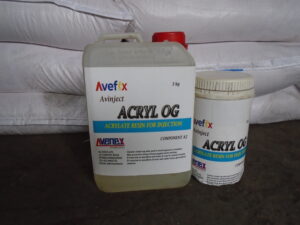Products
AVINJECT 2C ACRYL-OG
AVINJECT 2C ACRYL-OG
Non-toxic, methacrylate-based injection system for sealing and consolidation works in presence of water.
The Avinject Acryl OG system is non-toxic for the
environment and is used for sealing and
consolidation works in presence of water. The
substance is injected through packers or injection
hoses. The low viscosity of the product assures high
fluidity. It's a hydrophilic system with a controlled
set time used in the following applications:
- Water shut off.
- Selective plug for gas application.
- Plug & abandon.

- Al component (resin): 23 kg
- A2 component (catalyst): 3 kg
- B1component (initiator): 1kg
- The following mixtures need to be prepared Mixture 1: ACRYL-OG Resin (A1) +ACRYL-OG catalyst (A2) Mixture 2: ACRYL-OG Initiator (B1) + water
- The mixtures are then mixed in a volume ratio of 1:1 Prepare the mixture of components A1 and A2 and 81 +water in two opaque plastic containers each with a lid. Take an equal volume of each component and check the setting time of the mixture. Adjust the ratio if necessary. The mixture of component A1and A2 is stable for at least a few hours, if kept covered in a cool and dry place even longer. The mixture of component B1+water is stable for a few days below a temperature of 25॰C.
- Application For slow setting one can use a mono-component pump. Only prepare amounts that can be injected before the gel sets by mixing one volume of components A1 and A2 and one volume of components 81and water. For all types of etting, the use of a two component methacrylate pump is recommended. Both the mixtures are injected in a volume ratio of 1:1.
- Handling When handling the ACRYL-OG system, only stainless steel or plastic containers can be used (PVC, polyethylene, polypropylene}. Avoid any contact between the A2 component or catalyst and the 81 component or initiator without having been diluted in their respective mixture (resin + cat and initiator + water). The mixtures have to be perfectly homogeneous before use. Do not add more than three volumes of water. Cleaning of equipment: water.
- The standard injection fluid is obtained by mixing two mixtures in a ratio of 1:1. However depending on the conditions of the injected substrate the quantity of water present in the injection solution may be up to 3 time the volume of resin.
- Viscosity The viscosity of the ACRYL-OG solution will depend on the temperature and dilution. It will remain constant up to the setting point.
- Setting Point Gelling slows down at low temperature but still fast even below 0OC. In acid conditions the reaction is slowed down, while under alkaline conditions the reaction is speeded up. The presence of minerals and metals (specially iron and copper} may increase or decrease the rate of setting. Depending on their concentration. When immersed in water the unconfined gel can absorb up to 2 times its own weight of water in a few weeks without cracking. Under humid conditions the volume of the gel will remain approximately constant. Inthe absence of water, the gel will slowly shrink, without cracking. These dimensional changes are reversible and do not degrade the gel. For better control of dry-wet cycles use ACRYL-OG Polymer.
Store at a temperature above 0॰c and below 25॰C. Do not expose directly to light or sunlight. Storage in these conditions for min. 12 months.
❖ Do not breathe dust/fume/gas/mist/vapor/spray
❖ In case of improper ventilation wear respiratory protection
❖ Wear protective gloves/clothing and eye & face protection
❖ If in eyes: Rinse cautiously with water for several
minutes, remove contact lenses, if present & easy to do.
Continue rinse.
❖ If on skin or Hair: - Take off immediately all
contaminated clothing. Rinse skin with water & shower
The Acryl-OG System Consists of Three Products:
- Component A1: ACRYL OG resin
- Component A2: ACRYL OG catalyst, a liquid activator for standard setting times between 10 seconds and 30 minutes.
- Component B1: ACRYL OG initiator, in powder form to be dissolved in water.
Technical Data
| Property | Value |
|---|---|
| Appearance | Orange liquid |
| Active Content | 42% |
| Water Solubility | Soluble |
| pH | 6.5 - 7.0 |
| Density | 1.2 kg/l |
| Viscosity at 20°C | 10 - 20 mPa.s |
| Dry-Wet Cycles Resistance | Conforms (EN ISO 3219, EN 14498) |
| Resistance to pH | Up to 12 |
Reaction Time (5% catalyst)
| Temperature | 0.5% Init | 1% Init | 2.5% Init | 4% Init | 5% Init |
|---|---|---|---|---|---|
| 5°C | 40'30" | 18'21" | 8'02" | 5'30" | 4'04" |
| 10°C | 24'20" | 14'14" | 5'52" | 3'40" | 2'58" |
| 15°C | 10'19" | 5'30" | 3'24" | 2'31" | 1'54" |
| 20°C | 9'47" | 5'18" | 3'10" | 2'22" | 1'43" |
| 25°C | 5'40" | 3'13" | 1'22" | 1'02" | 49" |


